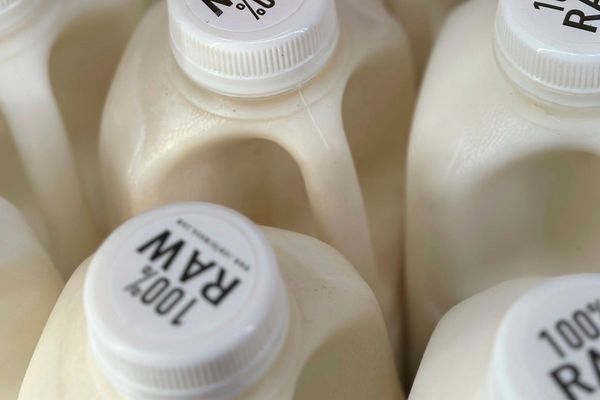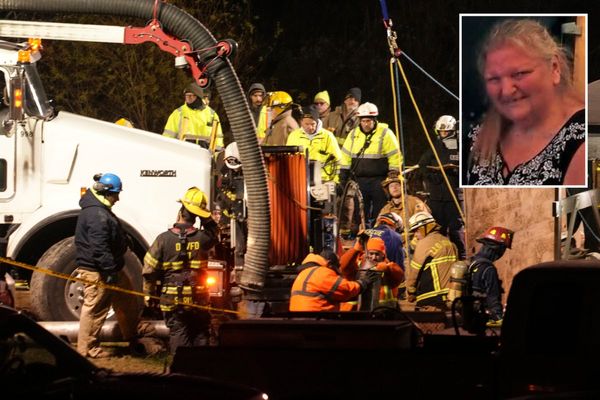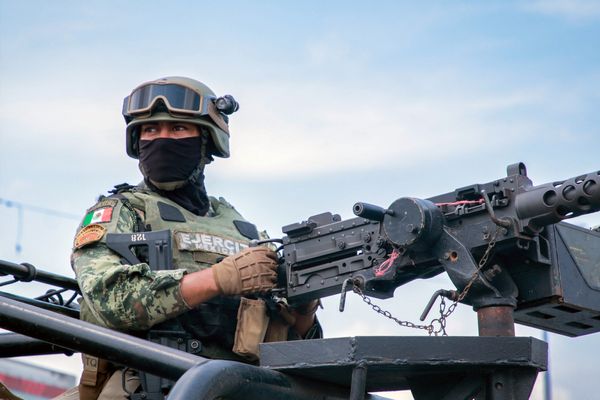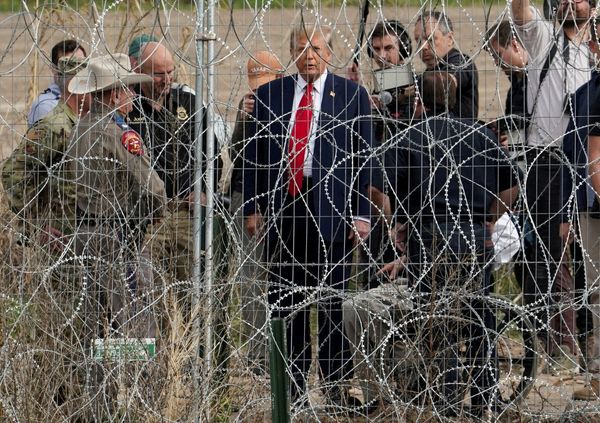In the 23 years of peace in Northern Ireland, one death — the murder of young journalist Lyra McKee by a paramilitary — has shown up the stark reality that the civil war isn't over.
Nichola McKee Corner is still trying to accept that her "peace baby" sister, Lyra, was killed in a flare-up of sectarian violence.
The younger generation was supposed to have a break from the past.
Born after the historic peace agreement on Good Friday in 1998, they were promised a "peace dividend".
They would have jobs and opportunities denied to previous generations and be free of the shackles of the violent, blood-soaked decades, where the mainly Protestant Loyalists and mainly Catholic Republicans warred over the province and its membership of the British Union.
Instead the "peace babies" are disillusioned — and worried.
Last week, many shuddered as thousands of Protestants loyal to the British Union marched defiantly down the streets of Belfast.
Some with balaclava masks are suspected of being paramilitary members.
They're protesting because of the Brexit settlement late last year, which drew a Customs border along the sea between the Republic of Ireland and the UK and aberrantly included Northern Ireland.
This barrier is already choking Northern Ireland's ports, with delays and extra costs, and it's not fully implemented yet.
Most seriously, it has inflamed Protestant sensitivities, leaving them feeling cut off from the rest of the UK and threatening their British identity. Some are calling it "Boris's Betrayal", blaming UK Prime Minister Boris Johnson for letting them down.
"We grew up in a peaceful time," says 23-year-old student Anna McAree. "(But) I think people realise that there's still these dark forces in the shadows that still want to stir things up."
Northern Ireland is marking its centenary this year, but celebrations have been muted.
All along, the peace has been fragile.
The old illegal paramilitary forces like the mainly Catholic Irish Republican Army (IRA) and the Protestant Ulster Volunteer Force (UVF) laid down their guns as part of the settlement, but it did not stop hostility and division.
A power-sharing arrangement between the two main political parties fell apart in 2017, through apparently irreconcilable differences.
Then the hand of the past reached up, as splinters of the old paramilitaries re-asserted their power.
Hope for a better life
In 2019, the young, high-profile advocate of a new Northern Ireland was murdered.
Lyra McKee was an award-winning journalist and LGBT rights campaigner.
She was a beacon of hope for the future and wrote of a Northern Ireland that didn't care about borders, religious creed or political affiliations.
"I don't want a united Ireland or a stronger Union," Lyra wrote. "I just want a better life."
Nichola was 15 years old when Lyra was born. They were as "close as close" — Lyra was like one of her own children.
They were a fixture together in the working-class Catholic area of Belfast where they lived.
Despite a close and loving family, Lyra struggled growing up gay in Northern Ireland, and spoke of the difficulties at a TEDx event in 2017.
"I hated myself for much of my life because of what religion taught me about people like me, and when I stopped hating myself I started hating religion."
Hers was an inclusive world and she made friends from all walks of life, on both sides of the sectarian divide.
On that night in April 2019, police raided homes in the Creggan estate, a working-class Catholic area on the outskirts of the province's second-biggest town, Londonderry.
They searched for guns and bombs ahead of a commemorative Easter march but didn't find any.
It sparked a riot, with petrol bombs, bricks and ball bearings tearing at the police and their armoured jeeps.
The disturbance drew onlookers and reporters. In amongst them, watching, was Lyra McKee.
Nichola says it was the first riot the 29-year-old had ever seen. At 10:56pm she tweeted a photo of the flames and petrol bombs, writing: "Derry tonight. Absolute madness."
They were her last words to the world.
Lyra took shelter near a police vehicle and a masked gunman, emerging from behind a wall, fired a volley at the officers. One bullet struck Lyra in the head.
A little later, a policeman rang Nichola to tell her the devastating news.
The whole of Northern Ireland felt the impact of that bullet.
Lyra's funeral brought together then UK prime minister Theresa May and bitter political rivals from the Republican Sinn Fein party and the Protestant Democratic Unionist Party.
Seeing the local politicians who had refused to govern together sitting side by side in the pews, Lyra's friend, Father Martin McGill, asked them from the pulpit: "Why in God's name does it take the death of a 29-year-old woman, with her whole life in front of her, to get to this point?"
Her death revived the spectre of sectarian violence. Political leaders were forced to re-engage with the peace process.
Ringing in their ears was the admonishment from Father McGill that the younger generation don't need guns: "They need jobs, they need a better health service and education. They need a life."
In the shadow of the 'peace walls'
This was the promise. Yet James Scott, a community worker who lives in Belfast's Protestant Shankill area, feels little has changed on the ground.
"Obviously there was hope when we seen in the nineties, when we seen the Good Friday Agreement," he says.
"But it's quite decayed and there's not a lot of investment in the area. So there's a lot of mental health issues, there's a lot of addiction issues."
From their living room, the Scott family can see one of Belfast's 80 or so "peace walls" — fences raised in the decades before the peace, called "The Troubles", to physically separate Catholics and Protestants.
There's a plan to demolish the walls to encourage integration but the people living there think they're not ready.
A few years ago part of the wall near James's house was removed for repair. They weren't prepared for what happened.
"In that very short period of time, it showed us that obviously the real barrier is in us, and the people who are living on either side of that peace line."
When days of riots broke out in April protesting against the sea border, the clash between Catholics and Protestants flared at a hotspot called Lanark Way, just along the wall from the Scotts' home.
James and his wife, Julie, had to bundle their children off to their grandparents, as the area filled with petrol bombs and police in riot gear.
A hundred police were injured in scenes not witnessed since The Troubles.
The Scotts bought here because it was affordable. Now they are pretty much stuck. They're renovating their home and have aspirations for their five children, but the area is mired in problems.
"I think there's potential attacks from paramilitary organisations," he says. "It's a controlled area, very much a controlled area."
The paramilitaries are small in number but allegedly involved in drugs and crime, and draw young unemployed and disaffected youths into their orbit.
"What we've witnessed over the past probably five to 10 years especially is a more divisive, dividing political community," James says.
"It's about celebrating battles, it's celebrating death, celebrating conflict and rebellion."
The chains of the past
Two years on from Lyra's death, her family still don't know who pulled the trigger.
The New IRA paramilitaries have admitted to the killing but have also threatened the people of Creggan not to "squeal" to police.
Nichola and the family launched a campaign for justice in April this year.
"We want the gunman responsible for killing her, you know?" Nichola says.
"But true justice for the people of Creggan and the people of Northern Ireland would be to get all of those people who are responsible in those criminal activities, to get them all off the streets, so that everyone is safe going forward."
Lyra's vision for the future lives on among many in the "peace baby" generation, but worry intermingles with student Anna McAree's optimism.
"I do remain hopeful because I do want to stay here; this is where I see myself," she says.
"But unless the opportunities build, then, people like me, we're going to have no choice but to try and find somewhere else."
Karl Duncan, 19, is from a mixed Protestant and Catholic family, and is active in youth politics aiming for Irish unification.
He believes there will be no progress until poverty is alleviated, but says integrating the communities is important, too.
"I am very hopeful that we can make a change in Northern Ireland ... but we have to fight for it," he says.
"We need to push for things like integrated education so that we can make Northern Ireland work as a whole."
The new ideals are wrestling with old convictions.
In a disturbing move, the Loyalist Community Council, which represents many of the loyalist paramilitary groups, has withdrawn its support for the Good Friday Agreement and called on UK Prime Minister Boris Johnson to resolve the sea border satisfactorily.
Peace is holding for now, but passions are running strong. It leaves the threat of renewed violence hanging heavy in the air.
Jamie Bryson, who edits the Loyalist Voice online news site, was only eight when peace was declared.
But his heart lies with the Union and he fiercely resents the "British Betrayal" the sea border represents.
"That has created untold anger and frustration," he says. "So it's vitally important if there is to be peace and stability in Northern Ireland that the protocol is removed."
Nichola McKee Corner, echoing her sister, says it's time to say goodbye to the bombs and bullets.
"I hope we can finally break free from the chains of the past and create a new, better Northern Ireland for everyone."
Watch Foreign Correspondent tonight at 8pm on ABC TV and iview, and streaming live on Facebook and YouTube.







